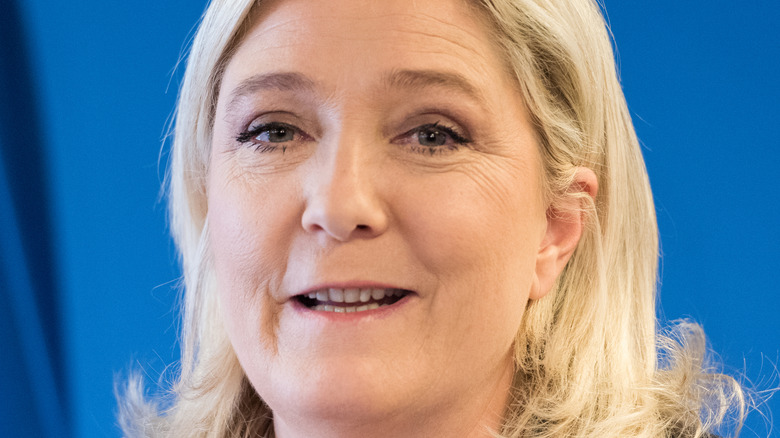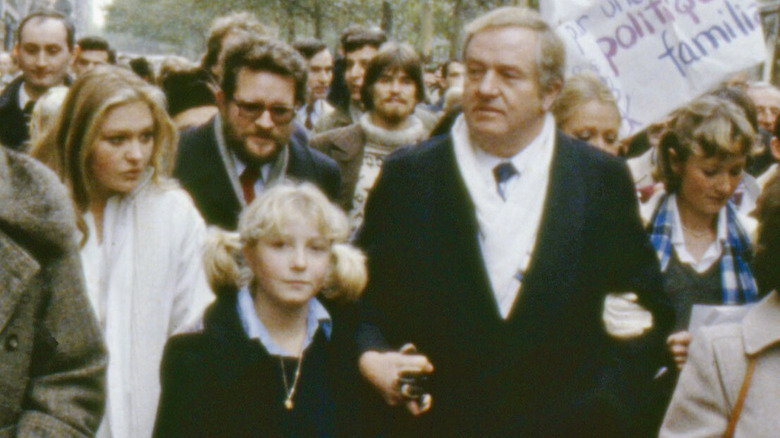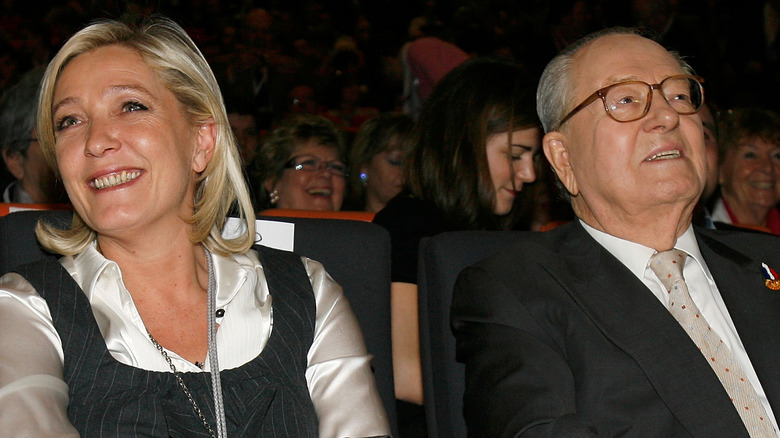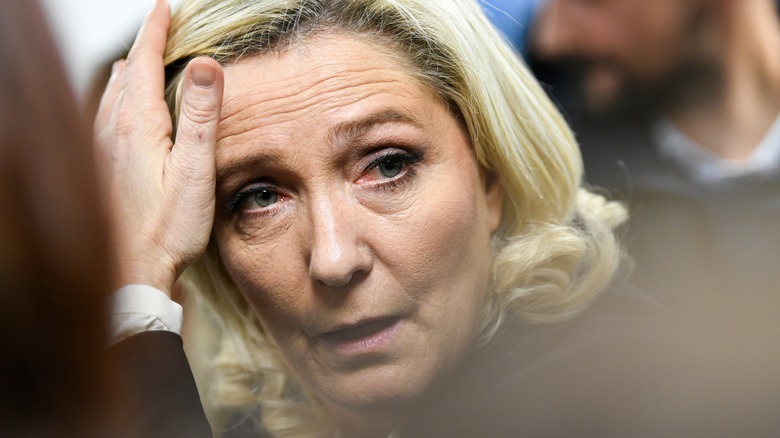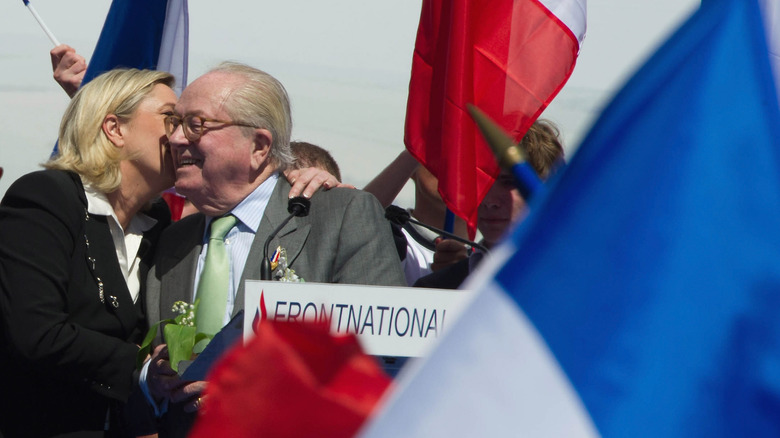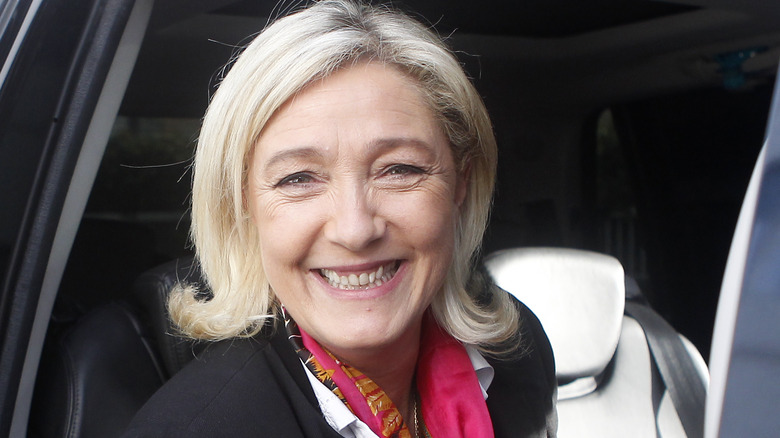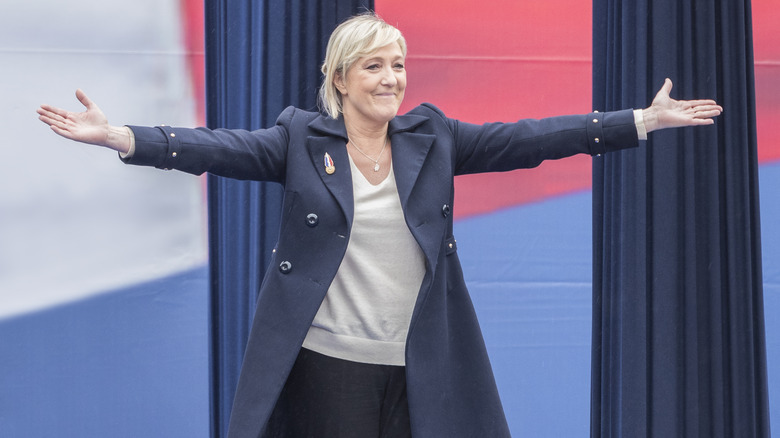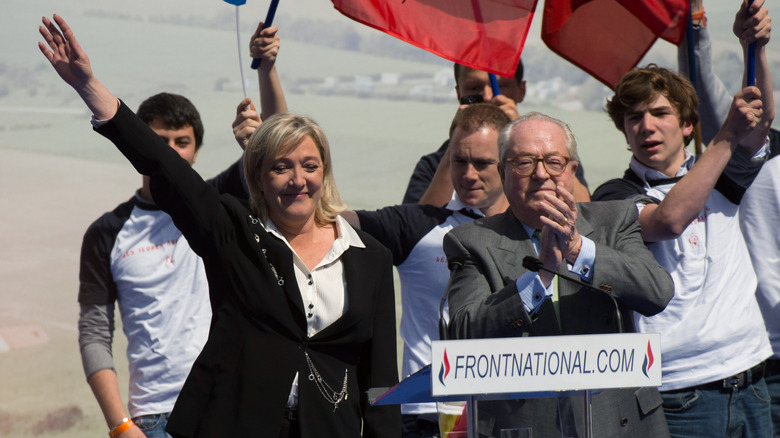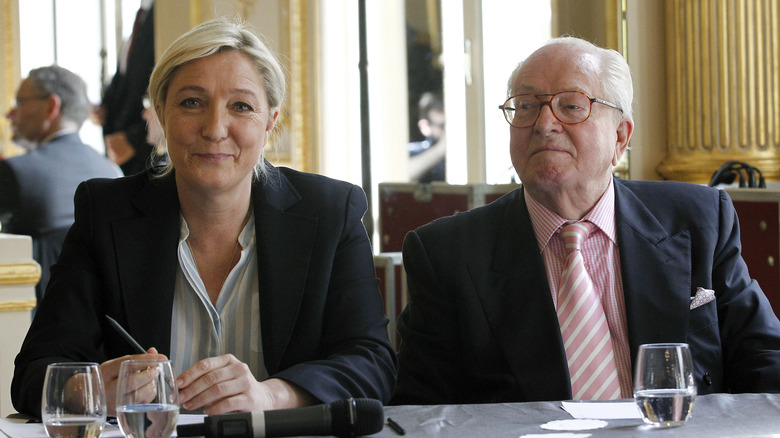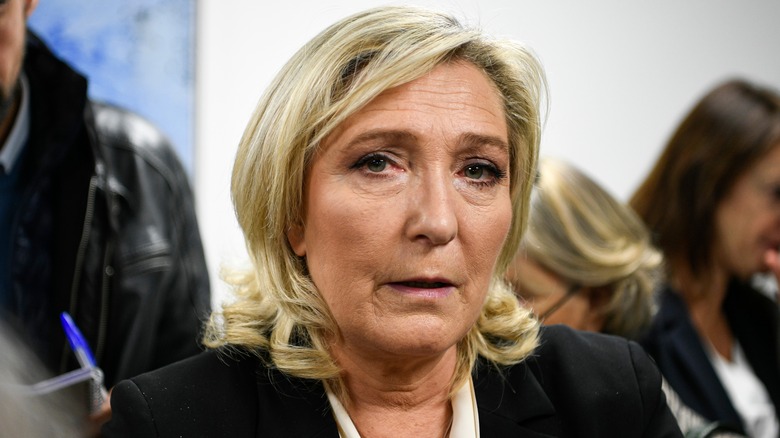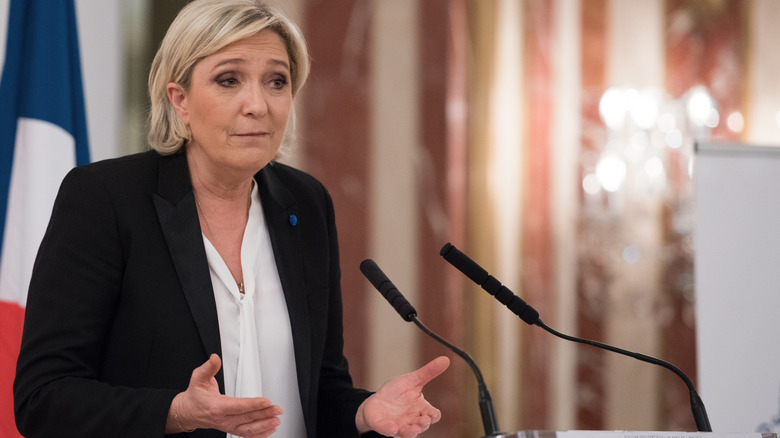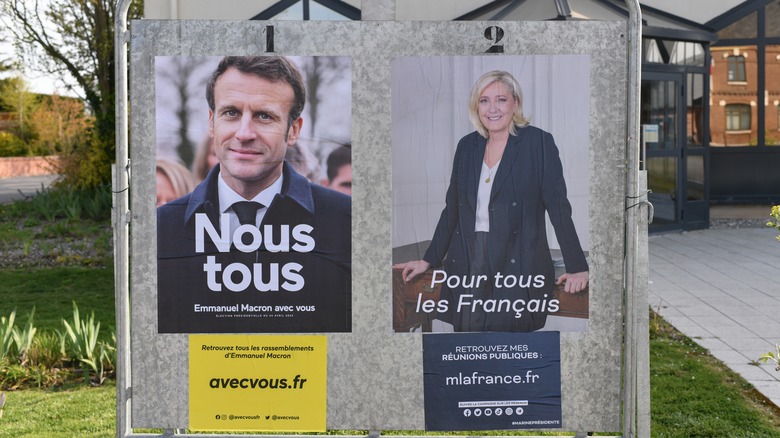What You Never Knew About Marine Le Pen
French politician Marine Le Pen is high on the list of controversial figures. She is best known for being a member of the French far right's first family. Her father, Jean-Marie Le Pen, founded the French National Front (FN) in 1972, a political party long viewed as "racist and anti-semitic," according to BBC News. Marine is the youngest of three sisters and reportedly grew up in what some would dub a very peculiar environment.
"Marine Le Pen grew up in a very odd atmosphere, a family that appeared close but was actually very distant," according to David Doucet, the co-author of Le Pen's biography, "La Politique Malgré Elle" (via The Guardian). "She lived almost 20 years without her mother. Her father hardly knew her," he continued. "She was brought up by nannies and governesses, left to her own devices."
As of this writing, Le Pen is currently in a race once again for the French Presidency against current President Emmanuel Macron. She has forged ahead, despite her rocky upbringing, and has made a life of her own after emerging from her father's shadow. She has, indeed, become a national figure in her own right.
Marine Le Pen's family home was bombed
In November 1976, while Marine Le Pen and her family were sleeping, a bomb tore through their apartment building. The then-8-year-old and her sisters were abruptly woken to pieces of broken glass and debris everywhere. The bomb was reportedly meant for her father, Jean-Marie Le Pen, who was president of the National Front at the time, according to NPR. Four other residents who lived in the building were injured, and a baby fell from the 5th floor during the explosion (via Imago).
In her memoir titled "À Contre Flots" (which translates to "Against the Flow"), Le Pen recalled the horrific incident. In her book, she illustrates the aftermath in words and images, including pictures of her family photos being scattered all over the street and their rabbit Rainbow "vitrified" on their sofa. She wrote, "It took that night of horror for me to discover that my father ... was in politics" (via The New Yorker).
In reference to that terrible evening, she wrote in her autobiography, "That night I went to sleep like all little girls my age. But when I woke, I was no longer a little girl like the others" (via NPR). The culprits were reportedly never caught for the heinous act, but thankfully no one was killed.
Her mother left when she was a teenager
Marine Le Pen's mother, Pierrette Lalanne, left her husband and children when Le Pen was 15 years old. According to author Cecile Alduy, who wrote "Marine Le Pen prise aux mots," the Lalanne's departure was sudden and without warning. She told NPR, "She came back from school, and all her mother's clothes were gone."
Le Pen was heartbroken and didn't speak to her mother for 15 years. In her autobiography, she detailed her parents' very public split: "For a month and a half I vomited every day. I was incapable of feeding myself. ... What I suffered was the most awful, cruel, crushing of pains of the heart: my mother did not love me" (via Express).
In 1987, Lalanne posed in the 23rd issue of Playboy Magazine's French edition in an attempt to get back at her ex-husband. Pierrette dressed up in a French maid costume for the shoot to mock Jean-Marie, who told her she should look for work as a maid when she attempted to claim part of the couple's property. Her daughters weren't happy about the photos, and in an interview with Paris Match Magazine, middle child Yann Le Pen said their mother "had hurt Papa, and that was the goal, but she also hurt us," according to the Los Angeles Times.
She feels her last name is a burden
Biographer Cecile Alduy told NPR that Marine Le Pen's last name "was always a burden." She continued, saying, "She has described how being the daughter of Jean-Marie Le Pen as the National Front was emerging as a new controversial force, on one hand, [led] her to idealize her father, who was greatly criticized. But she also suffered."
Le Pen didn't grow up with many friends and felt that she and her sisters were shunned because of their father's legacy, which followed them even in adulthood. "It wasn't easy for people to go out with Marine Le Pen," she once told Closer magazine (via France24). "I remember one man chose to break up with me, the pressure from his social circle was so heavy."
Supposedly, Le Pen and her sisters were treated pretty cruelly in school, and teachers would call them "daughters of a fascist," according to The Guardian. Alduy feels that this rejection from those around her led her to stick close to her father and the National Front party (via NPR).
Marine Le Pen was not supposed to be her father's successor
According to the Evening Standard, "[Marine Le Pen's] older sister, Marie-Caroline, was originally meant to be Jean-Marie's successor, but dropped out of a local election after her father's racist comments" (via Yahoo News). That's when Marine Le Pen decided to step in and join her father's party at the age of 18. In 1998, Le Pen took more of an administrative role in the party and would go on to work as the National Front party's director of legal affairs five years later before becoming president in 2011.
A friend of the Le Pen family reportedly said that Marine Le Pen's personal and political life was all rolled up into one during her adulthood. The friend continued, saying, "Her father was the FN, and she chose all her lovers from the party too. The FN became her life. It was the Le Pen FN against the world" (via Evening Standard).
The politician is a qualified lawyer
Marine Le Pen has advanced studies in criminal law and six years of legal practice under her belt. In 1991, Le Pen received a law degree from the University of Panthéon-Assas and then continued her studies for another year to earn an advanced degree in criminal law from the institution. After becoming an attorney, Le Pen practiced law from 1992 to 1998 in Paris (via Britannica).
During her time as an attorney, she did reportedly some pro-bono work defending immigrants who were facing exile from France (via Yahoo News). Le Pen eventually left her law career after taking on a more significant role within the National Front party. She climbed the ranks in the FN and used her law background when she became the party's director of legal affairs. From there, she became the Vice President of the Party in 2003 (via Britannica).
In a 2014 interview with Time, she explained how she got into politics, saying, "I was not really conscious of it. I fell into it. I was weaned on politics my whole life. I tried to get away from politics, to be a lawyer, but it always caught me, like a virus."
Marine Le Pen has been divorced twice
In 1995, Marine Le Pen wed Franck Chauffroy, a well-known member of the National Front party. They share three children, Jehanne, Louis, and Mathilde Chauffroy — the latter of whom are twins. By 2000, though, the couple were divorced. In 2002, she went on to marry another National Front party member, Eric Loiro. However, the couple would divorce after four years of marriage. Although she has not remarried, she has reportedly been in a long-term relationship with a man named Louis Aliot for the last 13 years (via Express).
Le Pen is generally tight-lipped regarding her love life and her children. Nevertheless, she did say the "psychological difficulties" of being a single mother to three children have prepared her to be President of France (via The Times). While speaking to a group of voters in Rheims, France, she said, "Such ordeals instruct you and construct you." She went on to tell her constituents that she was ready to be their president.
She expelled her father from the National Front Party
In 2011, when Marine Le Pen took over as the president of the National Front, she reportedly worked hard to guide the party far away from its prejudiced and anti-Semitic history. In May of 2015, she made a bold decision. She suspended her father from the party because he had restated comments that he previously made regarding the horrors of the holocaust "a mere detail of history" according to The Guardian.
Jean-Marie Le Pen initiated a legal challenge after the suspension, and on July 2, 2015, a court reversed the decision made by his daughter. It was ruled that the appropriate steps had not been taken in the suspension. However, after an extraordinary general meeting (EGM), he was officially expelled. According to BBC News, Marine Le Pen said her father should "no longer be able to speak in the name of the National Front."
Le Pen also stated, "His status as honorary president does not give him the right to hijack the Front National with vulgar provocations seemingly designed to damage me, but which unfortunately hit the whole movement" (via The Guardian). After the banishment, he said, "I am outraged; I feel like I've been ambushed" (via Yahoo News).
Jean-Marie Le Pen disapproved of his daughter's presidential campaign
In 2017, when Marine Le Pen was in a showdown with Emmanuel Macron for a presidential runoff, Jean-Marie Le Pen told RTL radio that he disliked his daughter's campaign, saying, "I think her campaign was too laid-back. If I'd been in her place, I would have had a Trump-like campaign, a more open one, very aggressive against those responsible for the decadence of our country, whether left or right" (via Reuters).
Throughout her political career, Marine Le Pen has made a point to state that she and her father's political stances are relatively different. "My father spent a good part of his life fighting traces of ultra-communism. And I've spent a good chunk of my life fighting against ultra-liberalism," she disclosed in an interview with Time. "Obviously the context and the threats have changed."
In an exclusive interview with the LeJournal du Dimanche, Jean-Marie was asked if he thought his daughter could become Head of State. While he said she had "the ambition," he didn't think she had the measures to do so — neither "the ethical means nor the political means." Le Pen's father also disclosed that he would not vote for his own daughter unless she changed how she was operating things and would not support her in any way whatsoever.
Marine Le Pen is under investigation for embezzlement
According to the French investigation website Mediapart, an investigation report that the European Union (EU) anti-fraud office forwarded to French investigators alleges that during Marine Le Pen's time as a member of the European Parliament from 2004 to 2017, she redirected EU funds to the tune of €137,000. Her father, as well as a few others, including Bruno Gollnisch, a French politician and a member of the National Front, are also being investigated for misusing public money (via The Guardian).
Le Pen's attorney, Rodolphe Bosselut, has stated that he was "dismayed" by the actions undertaken by the EU anti-fraud office. He also claims that parts of the report are associated with decade-old information and stated that his client opposes the charges. Supposedly, in 2010, Le Pen spent €5,000 on hotel accommodations for 13 members of the far-right party for the European Regions and the Financial Crisis conference that, according to one of the members, allegedly served as a cover for the group to converse about the party's presidency (via The Guardian).
She opposes a current Russian sanction
For some time now, Marine Le Pen has been thought of as an ally of Russia's President Vladimir Putin. She has refuted those accusations in the past, stating they were "inaccurate and particularly unjust" (via The Guardian).
In 2022, Le Pen faced backlash for supposedly being too friendly with Russia amidst the war in Ukraine. She made headlines after revealing she doesn't support the sanctions against Russia when it comes to gas and oil. In an interview with France Inter Radio, she said, "I am perfectly in favour of all the other sanctions. I do not want French people to suffer the consequences of sanctions" (via BBC News).
During a 2022 press conference, the French presidential candidate said that once the war is over and "settled by a peace treaty," she would "call for the implementation of a strategic rapprochement between Nato and Russia" (via The Guardian).
Marine Le Pen's campaign fliers are controversial
French presidential candidate Marine Le Pen has another controversy on her hands. A Jewish group associated with Le Pen's National Rally Party has allegedly urged her to replace her campaign posters where she uses the "OK" signal known to be used by white supremacists. National Jewish Rally leader Jean-Richard Sulzer, who worked with Le Pen on her 2012 presidential campaign, stated, "If she does not change the photo, we will call to vote for [French President Emmanuel] Macron" in the election runoff on April 24, per The Jerusalem Post. As Sulzer explained, "It's a wink to the supremacists, saying I am one of you."
Christophe Capuano, professor of contemporary history at France's University of Grenoble Alpes, took to social media to post campaign photos of Le Pen and Macron, where the two make nearly identical poses. However, in the photo, Le Pen makes the controversial hand gesture where "one of her hands is gripping the desk as her left thumb and index finger make a circle, while the other fingers are fanned out on the desk." In French, he tweeted, "Poster of Marine Le Pen for the second-round campaign. Does this remind you of anything?"
So far, no reports have indicated whether or not Le Pen plans to replace the campaign photos.
